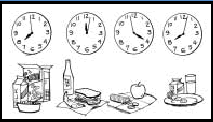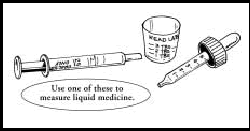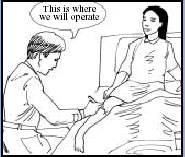Medical errors are mistakes that can happen with your health care. Medical errors can hurt or even kill people.
The Government, hospitals, doctors, and others are working hard to prevent medical errors. The tips here show what you can do to help keep you and your family safe. These tips are based on studies by many medical researchers.
Select for PDF File (203 KB). PDF Help.
What Are Medical Errors?
Medical errors are mistakes that can happen
with medicine, surgery, tests, and other parts of your health care. Here is an example of a medical error:
Getting the wrong medicine is a medical error.

Top of Page
What Can You Do?
You can help protect yourself and your family from medical errors. The most important way you can do this is to talk. Talk to your doctor, nurse, and other health care workers.
- Tell them important things about your health.
- Ask them questions.
- Make decisions about your health
care with them.
Top of Page
What Can You Do To Make Sure You Get the Right Medicine?
Here are some tips to help you prevent certain kinds of medical errors.
Error: Your doctor or drugstore gives you the wrong kind of medicine.
- Bring all your medicines with you to show your doctor. This includes things like cold medicine, aspirin, vitamins, and herbs. This will help your doctor make sure that your new medicine does not cause problems with ones you already take.
- Tell your doctor if you have any allergies. Also tell about any problems your medicines have caused —such as a rash or stomach ache.
- When your doctor gives you a prescription, look at the writing. Is it easy to read? If you can't make out the letters, the drugstore may not be able to either.
- When you pick up your medicine at the drugstore, make sure it is what your doctor ordered.
Top of Page
What Can You Do To Make Sure You Take the Right Amount?
Error: You take too much or too little of your medicine.
Ask your doctor:
- At what times of the day should I take this medicine?
- Do I need to take it with food?

- How much should I take each time? That is, how many pills or how much liquid?
- If you have more questions when you pick up your medicine at the drugstore, ask.
- Know how to measure your liquid medicine. The label might use the word "teaspoon." But do not use spoons you eat with to measure your medicine. These do not hold the right amount.
Instead, use a special container to measure your liquid medicine. You can find things like these at
your drugstore.

Top of Page
What Can You Do To Help Yourself Get Better Faster?
Error: You get sick from staying in the hospital.
- Illness can spread in hospitals when health care workers do not wash their hands or wear gloves. It is okay to ask anyone who touches you whether they have washed their hands.
- Some foods can make you sicker. Know what foods your doctor doesn't want you to eat.
Top of Page
What Can You Do To Make Sure the Doctor Operates On the Right Part of Your Body?
Error: The doctor operates on the wrong part of the body.
- Talk to your doctor about the surgery. Ask what will be done. Ask where it will be done and the name of the surgeon.
- Ask if the surgeon does this kind of surgery often. Ask if many people have this surgery done at that hospital or clinic. People do better if they have an experienced surgeon.
- Ask your surgeon to make a mark with a pen before the surgery on the part of your body where the surgery will happen. Some doctors will sign their initials on the right part.

Top of Page
You Can Help Prevent Medical Errors
Remember: The most important way to do this is to talk. Talk to your doctor, nurse, and other health care workers. Bringing a friend or family member along can help.
To learn more about medical errors, call the AHRQ Publications Clearinghouse 1-800-358-9295
or go to the AHRQ Web sites section on Medical Errors.
Top of Page
Five Steps to Safer Health Care
Here are five tips from the Federal Government on how to prevent medical errors:
1. Speak up if you have questions or concerns.
2. Keep a list of all the medicines you take.
3. Make sure you get the results of any test or procedure.
4. Talk with your doctor and health care team about your options (choices) if you need hospital care.
5. Make sure you understand what will happen if you need surgery.
Select to learn more about Five Steps to Safer Health Care, a Patient Fact Sheet.
Top of Page
Current as of October 2001
AHRQ Publication No. 01-0017
Internet Citation:
Ways You Can Help Your Family Prevent Medical Errors! AHRQ Publication No. 01-0017, October 2001. Agency for Healthcare Research and Quality, Rockville, MD. http://www.ahrq.gov/consumer/5tipseng/5tips.htm

